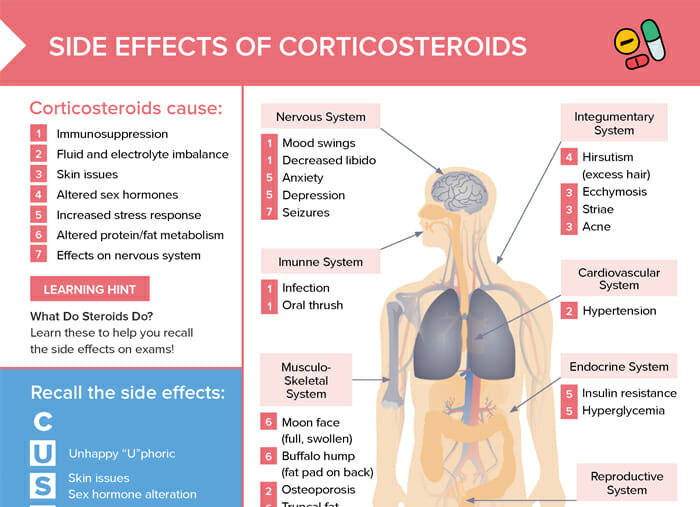Introduction
Corticosteroids, commonly referred to as steroids, are a class of medications widely used to treat a variety of inflammatory and autoimmune conditions. While these drugs can provide significant relief from symptoms and improve quality of life for many patients, their prolonged use can lead to a range of adverse effects. Understanding the risks associated with long-term corticosteroid therapy is crucial for healthcare providers and patients alike to make informed decisions about treatment and minimize potential complications.
Overview of Corticosteroids
Corticosteroids exert their effects by mimicking the action of cortisol, a hormone produced naturally by the adrenal glands. They work by suppressing inflammation, reducing immune system activity, and inhibiting the release of substances that contribute to allergic and autoimmune reactions. Common corticosteroids include prednisone, prednisolone, dexamethasone, and hydrocortisone, among others.

Effects of Prolonged Use
- Bone Health: Perhaps one of the most well-known side effects of long-term corticosteroid use is the increased risk of osteoporosis and fractures. Corticosteroids interfere with bone formation and accelerate bone resorption, leading to decreased bone mineral density and increased susceptibility to fractures, particularly in weight-bearing bones.
- Metabolic Effects: Prolonged corticosteroid therapy can induce metabolic changes such as insulin resistance, glucose intolerance, and ultimately, diabetes mellitus. These medications may also promote weight gain, redistribution of body fat (resulting in central obesity and a characteristic “moon face”), and increased appetite.
- Adrenal Suppression: Chronic corticosteroid use can suppress the function of the adrenal glands, leading to adrenal insufficiency. Abrupt discontinuation of corticosteroids after prolonged therapy can precipitate adrenal crisis, characterized by symptoms such as fatigue, weakness, nausea, vomiting, and hypotension.
- Cardiovascular Effects: Long-term corticosteroid therapy has been associated with an increased risk of hypertension, dyslipidemia, and cardiovascular disease. These medications can elevate blood pressure, promote sodium and water retention, and alter lipid metabolism, contributing to cardiovascular complications over time.
- Immunosuppression and Infection Risk: While corticosteroids suppress inflammation and immune system activity, they also impair the body’s ability to fight infections. Prolonged use of these medications can increase the risk of opportunistic infections, reactivation of latent infections (such as tuberculosis), and delay wound healing.
Management Strategies
- Risk Assessment: Healthcare providers should carefully assess the risks and benefits of corticosteroid therapy for each patient, taking into account factors such as the underlying condition being treated, dose and duration of treatment, and individual risk factors for adverse effects.
- Monitoring: Regular monitoring of patients receiving long-term corticosteroid therapy is essential to detect and manage potential complications promptly. This includes monitoring bone mineral density, blood glucose levels, blood pressure, lipid profiles, adrenal function, and signs of infection.
- Minimizing Exposure: Whenever possible, healthcare providers should strive to use the lowest effective dose of corticosteroids for the shortest duration necessary to achieve treatment goals. Non-pharmacological interventions and alternative treatment modalities should be considered when appropriate.
- Adrenal Insufficiency Prevention: Patients receiving prolonged corticosteroid therapy should be educated about the risk of adrenal suppression and instructed on the importance of gradual dose tapering under medical supervision to prevent adrenal crisis.
- Lifestyle Modifications: Patients should be encouraged to adopt healthy lifestyle habits, including regular exercise, a balanced diet rich in calcium and vitamin D, smoking cessation, and moderation of alcohol consumption, to mitigate some of the metabolic and cardiovascular risks associated with corticosteroid use.
Conclusion
While corticosteroids are invaluable medications for the management of many inflammatory and autoimmune conditions, their prolonged use carries significant risks of adverse effects. Healthcare providers must weigh these risks against the benefits of treatment and implement appropriate monitoring and management strategies to optimize patient outcomes. By fostering a collaborative approach between patients and providers and promoting judicious use of corticosteroids, it is possible to minimize the impact of long-term therapy on patient health and well-being.



